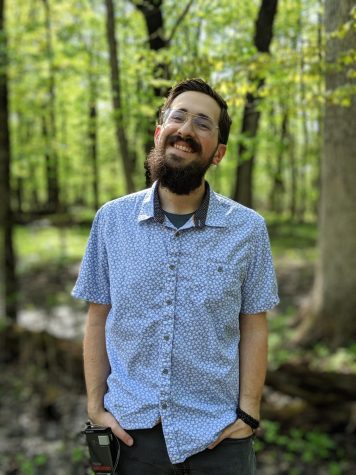GV professor highlighted for continued expertise on PFAS
Jun 10, 2019
As researchers, politicians and citizens work towards resolving per- and polyfluoroalkyl substances (PFAS) contamination in Michigan, many look towards Rick Rediske, a Grand Valley State University professor, for guidance. Recently, Rediske was featured in Science Magazine for providing his expertise to Concerned Citizens for Responsible Remediation (CCRR), a group of citizen scientists who revealed PFAS contamination by tannery company Wolverine Worldwide.
While PFAS contamination has been making waves in Michigan because of its harmful effects on human and environmental health, it has also become an empty buzzword to those unfamiliar with it. Rediske describes PFAS as compounds that do not degrade, typically used in waterproofing, non-stick coatings, stain resistance and fire fighting foams. When in the body, they bind to proteins and lead to immune system suppression, cancer and more.
The Wolverine Worldwide situation unveiled and prompted action upon new discoveries in the region, but dealing with this type of contention is nothing new for Rediske. He was involved in a legal battle in the 90s where consultants representing Whitehall Leather attempted to discredit his studies. The same firm was representing Wolverine when he was approached by CCRR.
“I was very concerned about helping an unpopular group and go against a powerful company and legal team,” Rediske said.
But when CCRR presented their research in 2012, Rediske said he was convinced that they were correct about the extensive pollution problems at the tannery. The only issue was that there was no money to do the required sampling, meaning they had to acquire funding before convincing the Michigan Department of Environmental Quality (MDEQ), which is now known as the Michigan Department of Environment, Great Lakes and Energy (EGLE).
After CCRR found elevated levels of PFAS in fish near the tannery, Rediske has enough evidence to make a call to action, where he supported the group while they continued to uncover the sprawling contamination of PFAS on land and in the waters around Wolverine Worldwide.
Rediske said that the work of CCRR and their team of activists and scientists curbed a dangerous flow of contamination that would have only gotten worse if not for their initiative.
“I think the discovery of PFAS in the area would have been delayed by several years,” Rediske said. “There are over 1,000 residential wells contaminated with PFAS in Kent County and most have been treatment systems. There would have been several years more of people drinking PFAS-contaminated water.”
Especially following his involvement with CCRR, Rediske became a go-to source for journalists and politicians eager to learn more about the growing threat of PFAS in the region. He has worked with the likes of Michigan Sen. Gary Peters to educate communities and participate in public summits.
Rediske has still continued to be involved in sharing his knowledge with legislators. During a Nov. 13, 2018, state Senate hearing on GVSU’s Pew Campus, Rediske spoke to politicians about the local threat of PFAS and urged them to play active roles in resolving the contamination within the region.
There is no clear timeline for when the threat of PFAS will be fully addressed, but Rediske did encourage students and citizens alike to take part in supporting clean water and land. Rediske said that there is a lot of stances students need to take against carelessness in business, politics and state standards.
“Be informed and involved,” Rediske said. “Treat your own water if you are in a contaminated area. Demand PFAS-free products. Work with local, state and federal advocacy groups to ban hazardous PFAS chemicals and resolve contamination issues.”
As PFAS continues to circulate in conversations and progress remains a grey area, one thing is for certain: Rediske will continue to provide his expertise to protect citizens, the environment and scientific truth.






















